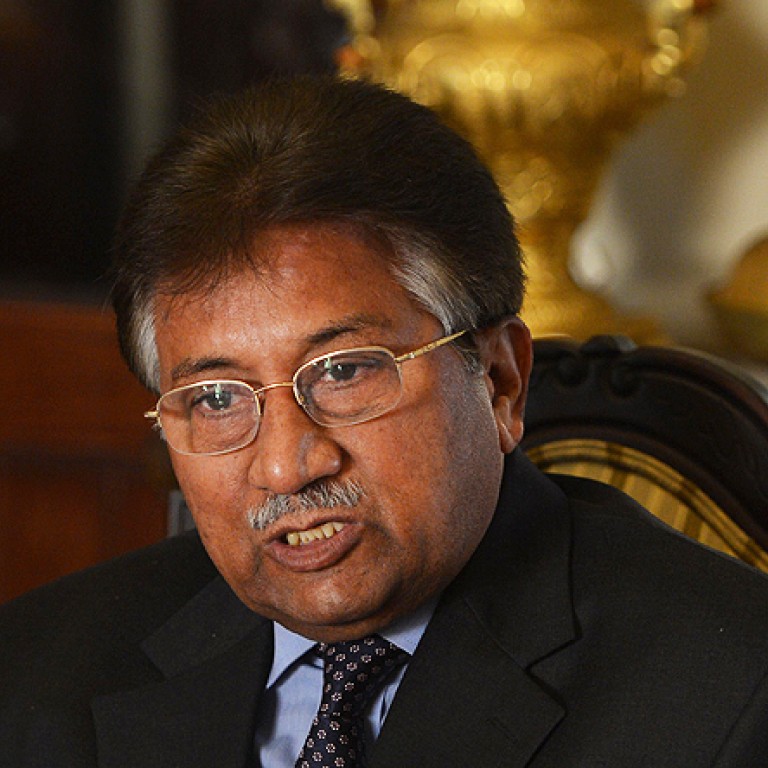
Musharraf suffers ‘heart problem’ on way to treason hearing
Pakistan’s former military ruler Pervez Musharraf was rushed to hospital on Thursday after suffering a “heart problem” on his way to court for a hearing in his treason case.
The 70-year-old had been summoned to the special tribunal in Islamabad after failing to show up for two previous sessions due to security threats against him.
Musharraf’s team says the allegations, which relate to his imposition of emergency rule in November 2007, are politically motivated and his lawyers have challenged the authority of the three-judge tribunal.
Jan Mohammad, a senior police official, told the court in Islamabad that Musharraf had fallen ill while being transported to the hearing under heavy security.
“He has been shifted to Armed Forces Institute of Cardiology after he got the heart problem,” Mohammad said.
An aide to Musharraf, who is facing a series of criminal cases dating back to his 1999-2008 rule, said the retired general was in “bad shape”.
[Musharraf is conscious] and oriented in time and space
Security was tight at the hospital in Rawalpindi, the garrison city near Islamabad, an Agence France-Presse journalist said, with soldiers and paramilitary Rangers standing guard.
An aide to Musharraf said the retired general was in “bad shape”.
A statement from his spokesman, Raza Bokhari, said Musharraf was conscious and “oriented in time and space” and was being examined by military doctors.
Judge Faisal Arab has said he did not wish to issue an arrest warrant for Musharraf, but may be forced to if he does not appear in court.
Earlier, Musharraf had cited a bomb scare in the vicinity of his home as reason for not attending the trial. Officials scanning the route to court spotted the explosive device on Wednesday along a road about two kilometres from Musharraf’s farmhouse in the outskirts of Islamabad.
Islamabad police officials said 1,000 security personnel were deployed to protect Musharraf but said they could not guarantee a bomb-proof vehicle for the former general to ride in.
Musharraf seized power in a 1999 military coup when he was army chief. He later became president and ruled until 2008.
The treason charges relate to his imposition of a state of emergency in 2007, when he was manoeuvring to extend his rule, and the detention of judges, in the face of growing opposition from the public and the judiciary.
Musharraf’s lawyers say the allegations, which relate to his imposition of emergency rule in November 2007, are politically motivated and his lawyers have challenged the authority of the three-judge tribunal.

Anwar Mansoor Khan, one of the lawyers, told the court he had been receiving threats and was unable to sleep the night before the hearing.
“I was under total threat … from 1am to five in the morning. Someone was banging on my door and ringing my bell,” Khan told the court.
When one of the judges asked who was threatening him, Khan answered: “This very government.”
The court promised to investigate but Khan walked out of court, followed by other members of Musharraf’s legal team.
“This never happened in my 40 years of practice. I will walk out,” Khan said.
Khan told the court on Wednesday he had been attacked in his car while travelling to the eastern city of Lahore following an earlier hearing.
Musharraf’s lawyers have previously said the treason case is an attempt by the government of Prime Minister Nawaz Sharif, whom Musharraf ousted in a coup in 1999, to settle old scores through the courts.
At one point during the sometimes testy proceedings, Qasuri pointed his finger at the prosecutor, Akram Sheikh, and said: “He’s not a prosecutor. He’s a persecutor!”
Sharifuddin Pirzada, another of Musharraf’s lawyers, also complained that he had been threatened.

Musharraf is the first former army chief to go on trial in Pakistan, setting up a potentially destabilising clash between the government and the all-powerful military.
The case is being closely watched for any impact on the relationship between Pakistan’s three power centres: the military, an increasingly assertive judiciary and the fledgling civilian government.
I was under total threat … from 1am to 5am. Someone was banging on my door and ringing my bell
There is concern that the trial could anger the army, which has ruled Pakistan for more than half its history since independence in 1947.
Musharraf recently told reporters the whole army supported him though the military leadership has given no indication that it might intervene in the trial.
Musharraf’s legal ups and downs have riveted a country that has experienced three military coups and where top generals and army chiefs have traditionally been above the law. The scenes of Musharraf going into and out of courtrooms, essentially being treated like a common citizen, has underlined how much prestige the power the Pakistani military has lost in recent years.
The army has said nothing publicly about the Musharraf trial but many retired military officers have stood up for him. A group of retired military officers met on Tuesday in Islamabad in what was essentially a show of solidarity.
The government pushed back against any suggestion that Musharraf may have the support of the military. Information Minister Pervaiz Rasheed said Musharraf was trying to use the army to cover up his crimes and that the army was a “national institution” devoted to serving their nation, not one individual.
